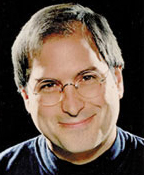Steve Jobs on 'entrepreneurial education,' circa 1995


Twelve years prior, Jobs put forth a similar educational philosophy for an Oral History Interview at the Smithsonian Institution.
Although Jobs’ remarks last week were summarized and headlined by the Associated Press as “Apple CEO lambasts teachers unions,” the totality of his thoughts on the U.S. education system encompassed much more.
Jobs may find my headline today to be more apropos of his principal thrust: “Steve Jobs on “entrepreneurial education.”
The Associated Press indicated that Jobs sought to liken schools to businesses, where principals would serve as CEOs:
What kind of person could you get to run a small business if you told them that when they came in they couldn't get rid of people that they thought weren't any good.? Not really great ones because if you're really smart you go, 'I can't win.
Jobs put forth to the Smithsonian in 1995 what I view to be an “entrepreneurial education” philosophy:
The market competition model seems to indicate that where there is a need there is a lot of providers willing to tailor their products to fit that need and a lot of competition which forces them to get better and better. I used to think when I was in my twenties that technology was the solution to most of the world's problems, but unfortunately it just ain't so. I'll give you an analogy. Alot of times we think "Why is the television programming so bad? Why are television shows so demeaning, so poor?" The first thought that occurs to you is "Well, there is a conspiracy: the networks are feeding us this slop because its cheap to produce. It's the networks that are controlling this and they are feeding us this stuff but the truth of the matter, if you study it in any depth, is that networks absolutely want to give people what they want so that will watch the shows. If people wanted something different, they would get it. And the truth of the matter is that the shows that are on television, are on television because that's what people want. The majority of people in this country want to turn on a television and turn off their brain and that's what they get. And that's far more depressing than a conspiracy. Conspiracies are much more fun than the truth of the matter, which is that the vast majority of the public are pretty mindless most of the time. I think the school situation has a parallel here when it comes to technology. It is so much more hopeful to think that technology can solve the problems that are more human and more organizational and more political in nature, and it ain't so. We need to attack these things at the root, which is people and how much freedom we give people, the competition that will attract the best people. Unfortunately, there are side effects, like pushing out a lot of 46 year old teachers who lost their spirit fifteen years ago and shouldn't be teaching anymore. I feel very strongly about this. I wish it was as simple as giving it over to the computer.
Rather than anti-union, I find Jobs to be pro individual accomplishments, in any and all endeavors.
Jobs in 1995 on opportunities to “innovate”:
One of the things that happens in organizations as well as with people is that they settle into ways of looking at the world and become satisfied with things and the world changes and keeps evolving and new potential arises but these people who are settled in don't see it. That's what gives start-up companies their greatest advantage. The sedentary point of view is that of most large companies. In addition to that, large companies do not usually have efficient communication paths from the people closest to some of these changes at the bottom of the company to the top of the company which are the people making the big decisions. There may be people at lower levels of the company that see these changes coming but by the time the word ripples up to the highest levels where they can do something about it, it sometimes takes ten years. Even in the case where part of the company does the right thing at the lower levels, usually the upper levels screw it up somehow. I mean IBM and the personal computer business is a good example of that. I think as long as humans don't solve this human nature trait of sort of settling into a world view after a while, there will always be opportunity for young companies, young people to innovate. As it should be.
Jobs extols vibrant entrepreneurial ambition of successful start-ups while rallying against stagnant bureaucratic rote of entrenched fiefdoms, be they in the business or education realms.
Jobs on teacher unions, circa 1995:
The unions are the worst thing that ever happened to education because it's not a meritocracy. It turns into a bureaucracy, which is exactly what has happened. The teachers can't teach and administrators run the place and nobody can be fired. It's terrible.
Mr. Jobs, I lend you my support, in what I am calling your “entrepreneurial education” philosophy.
I do not write as a disinterested observer, I have served as adjunct faculty in institutions of higher learning and, subsequently, have been required to be a member of a teachers union.